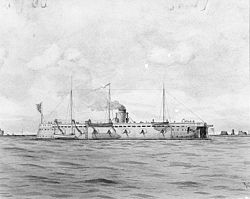 |
| USS New Ironsides |
HEADQUARTERS DEPARTMENT OF THE SOUTH,
In the Field, Folly Island, S. C., October 11, 1863.
Major General H. W. HALLECK,
General-in-Chief, U. S. Army, Washington, D. C.:
GENERAL: I have to report no important changes in the state of affairs here. From a recent conversation at some length with Admiral Dahlgren, I am led to the belief that no offensive operations against Charleston with the naval force now here will be attempted. The programme of operations in this quarter, which I submitted to you while at Washington, and which met the approval of not only the War and Navy Departments, but of the President also, and to secure the execution of which it was deemed proper to supersede the former naval and military commanders in this department, is doubtless fresh in your memory. It was as follows:
1. To make a descent upon, and obtain possession of, the enemy's fortified position on the south end of Morris Island.
2. To reduce Fort Wagner and Battery Gregg on the north end of Morris Island.
3. From positions thus secured, to demolish Fort Sumter.
4. the monitors to enter, remove the channel obstructions, run by the batteries on James and Sullivan's Islands, and reach the city.
5. Subsequent operations of the two branches of the service to be government by circumstances.
The entire programme was to be executed by a cordial and energetic co-operation of the army and the navy, excepting item 4, which was considered a specialty for the iron-clads alone. The first three pars of the programme have been successfully carried out. Fort Sumter is incapable of harming our iron-clads fleet, and I have received the written assurance of the General-in-Chief that the land forces have done all that I proposed to do with them, "and all that was hoped or expected." I desire to record my belief that the whole programme can be carried out, but that every day's delay is rendering its execution more difficult.
Very respectfully, your obedient servant,
Q. A. GILLMORE,
Major-General, Commanding.
Official Records, Series I., Vol. 28, Part 2, Page 105.
The Army and Navy generally were very much in league in combined operations during the war. In this instance, Gillmore is stating his appehension at the slowness of the Navy to move on Charleston. He underestimates the amount of damage the Confederates had inflicted on the naval force, but moreso, the wearing down of that force for operations by the nature of the ships involved and the supplies they required. It is perhaps merely human nature which makes individuals always exaggerate the difficulties they face and minimize those of others.
No comments:
Post a Comment